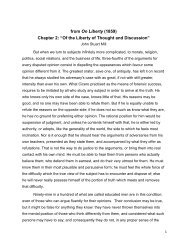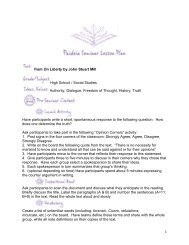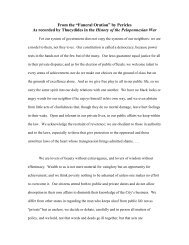Rousseau_contrat-social
Create successful ePaper yourself
Turn your PDF publications into a flip-book with our unique Google optimized e-Paper software.
eings, of which the part is one, and the whole minus the part the<br />
other. But the whole minus a part cannot be the whole; and while this<br />
relation persists, there can be no whole, but only two unequal parts;<br />
and it follows that the will of one is no longer in any respect general<br />
in relation to the other.<br />
But when the whole people decrees for the whole people, it is<br />
considering only itself; and if a relation is then formed, it is between<br />
two aspects of the entire object, without there being any division of<br />
the whole. In that case the matter about which the decree is made is,<br />
like the decreeing will, general. This act is what I call a law.<br />
When I say that the object of laws is always general, I mean that law<br />
considers subjects en masse and actions in the abstract, and never a<br />
particular person or action. Thus the law may indeed decree that there<br />
shall be privileges, but cannot confer them on anybody by name. It may<br />
set up several classes of citizens, and even lay down the qualifications<br />
for membership of these classes, but it cannot nominate such and such<br />
persons as belonging to them; it may establish a monarchical government<br />
and hereditary succession, but it cannot choose a king, or nominate a<br />
royal family. In a word, no function which has a particular object<br />
belongs to the legislative power.<br />
On this view, we at once see that it can no longer be asked whose<br />
business it is to make laws, since they are acts of the general will;<br />
nor whether the prince is above the law, since he is a member of the<br />
State; nor whether the law can be unjust, since no one is unjust to<br />
himself; nor how we can be both free and subject to the laws, since they<br />
are but registers of our wills.<br />
We see further that, as the law unites universality of will with<br />
universality of object, what a man, whoever he be, commands of his own<br />
motion cannot be a law; and even what the Sovereign commands with regard<br />
to a particular matter is no nearer being a law, but is a decree, an<br />
act, not of sovereignty, but of magistracy.<br />
I therefore give the name "Republic" to every State that is governed by<br />
28











